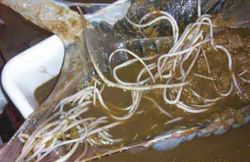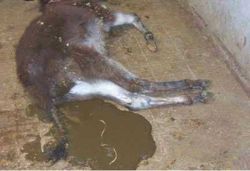Difference between revisions of "Ascarids - Donkey"
m (Text replace - '[[Sponsors|' to '[[Sponsors#The Donkey Sanctuary|') |
m (Text replace - '{{review}}' to '') |
||
| Line 1: | Line 1: | ||
| − | + | ||
=Equine roundworm, Ascarid= | =Equine roundworm, Ascarid= | ||
Revision as of 12:16, 18 March 2010
Equine roundworm, Ascarid
Introduction

Parascaris equorum is among the largest nematodes that affect equids. Generally it is believed that it is the same species of ascarid that is found in horses and donkeys. They are large roundworms up to 40 cm in length. Ascarids are considered to mainly affect foals, as adult horses acquire an effective resistance.
However, the situation in donkeys appears to be different. A study in South Africa revealed high infection prevalence with high faecal egg counts, in six-month to eight-year-old donkeys. Patent infections with high egg counts and a high number of adult worms are a common finding in adult donkeys in Ethiopia. Donkeys may, therefore, not develop a significant immunity against the infection.
- Large number of eggs are produced, which can survive for years in the environment
- Larvae, once ingested from grazing, migrate through the liver and lungs
- Infestations are usually derived from allowing foals to graze on the same pastures year after year
Signalment
- Affects both adults and foals
Diagnosis
Clinical signs

- Larvae can cause liver damage and signs of respiratory problems
- Heavy infection can cause stunted growth, ill thrift and diarrhoea
- Adult worms can block the gut, causing colic and even ruptures of the gut, which may be associated with anthelmintic administration
Laboratory tests
- Patent infection in the horse occurs at three months and diagnosis is from the faecal examination of the typical thick-shelled eggs of the parasite
Treatment
Anthelmintics used in horses are effective against adult ascarids in donkeys. In conjunction with treatment, a practical approach to control parascariasis is manure disposal, since practically all worm eggs and larvae will be killed by the heat generated during fermentation of the manure. On the other hand, in climatic conditions favourable for the eggs’ survival, ascarid eggs can remain viable for over a year.
References
- Trawford, A. and Getachew, M. (2008) Parasites In Svendsen, E.D., Duncan, J. and Hadrill, D. (2008) The Professional Handbook of the Donkey, 4th edition, Whittet Books, Chapter 6
|
|
This page was sponsored and content provided by THE DONKEY SANCTUARY |
|---|